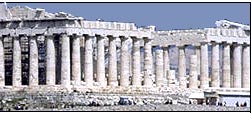Greece is no longer quite the bargain country it once was, although it is still considerably cheaper than many major nations with advanced economies. Certainly for most visitors, the hotels and restaurants will be cheaper than in major cities such as New York or London. That said, you will be spending money day in and day out, so it is important to understand the ins ands outs of how to handle your money.
Currency --The currency in Greece is the euro (pronounced evro in Greek), abbreviated "Eu" and symbolized by €. (Anyone possessing the old Drachma currency can exchange it in branches of the National Bank of Greece.) The exchange rate with the U.S. Dollar, British Pound, and other non-EU currencies varies -- often from day to day -- but we have chosen here to go with a rate of 1€ per U.S. dollar and €.67 per British Pound.
The euro € comes in 7 paper notes and 8 coins. The notes are in different sizes and colors. They are in the following denominations: 5, 10, 20, 50, 100, 200, and 500. (Considering that each euro is worth about $1, those last bills are quite pricey!) Six of the coins are officially "cents" -- but in Greece they have become referred to as lepta, the old Greek name for sums smaller than the Drachma. They come in different sizes and their value is: 1, 2, 5, 10, 20, 50. There are also 1€ and 2€ coins.
Although one side of the coins differs in each of the member EU nations, all coins and bills are legal tender in all countries of the euro area.
It's a good idea to exchange at least some money - just enough to cover airport incidentals and transportation to your hotel - before you leave home, so you can avoid lines at airport ATMs (automated teller machines). You can exchange money at your local American Express or Thomas Cook office or your bank. |







